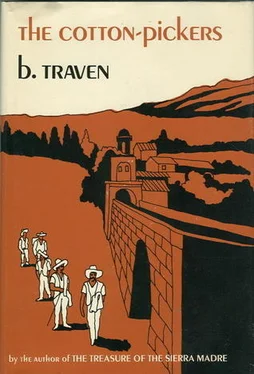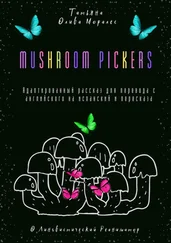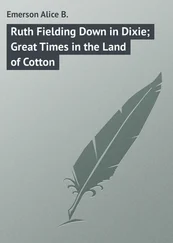B. Traven - The Cotton-Pickers
Здесь есть возможность читать онлайн «B. Traven - The Cotton-Pickers» весь текст электронной книги совершенно бесплатно (целиком полную версию без сокращений). В некоторых случаях можно слушать аудио, скачать через торрент в формате fb2 и присутствует краткое содержание. Год выпуска: 1969, Издательство: Hill and Wang, Жанр: Проза, на английском языке. Описание произведения, (предисловие) а так же отзывы посетителей доступны на портале библиотеки ЛибКат.
- Название:The Cotton-Pickers
- Автор:
- Издательство:Hill and Wang
- Жанр:
- Год:1969
- ISBN:нет данных
- Рейтинг книги:3 / 5. Голосов: 1
-
Избранное:Добавить в избранное
- Отзывы:
-
Ваша оценка:
- 60
- 1
- 2
- 3
- 4
- 5
The Cotton-Pickers: краткое содержание, описание и аннотация
Предлагаем к чтению аннотацию, описание, краткое содержание или предисловие (зависит от того, что написал сам автор книги «The Cotton-Pickers»). Если вы не нашли необходимую информацию о книге — напишите в комментариях, мы постараемся отыскать её.
—Book World
The Cotton-Pickers — читать онлайн бесплатно полную книгу (весь текст) целиком
Ниже представлен текст книги, разбитый по страницам. Система сохранения места последней прочитанной страницы, позволяет с удобством читать онлайн бесплатно книгу «The Cotton-Pickers», без необходимости каждый раз заново искать на чём Вы остановились. Поставьте закладку, и сможете в любой момент перейти на страницу, на которой закончили чтение.
Интервал:
Закладка:
Sometimes, we couldn’t get rid of straying animals. They insisted on following us, because they took a liking to our bulls perhaps, or liked the smell of our herd. I was always supposed to know at a glance if a stray animal got in with our herd, or one of ours lagged behind; but the brands and markings were often very similar and almost illegible. The foreman with an Indian driver was supposed to chase other herds away before our herd approached them; but it often happened that a few dozen head of our own would manage to scamper off with the other herd. Then the mix-up would be hell on hoofs, and we’d be soaked with sweat and have throats like sandpaper before we got them all sorted out again.
For a general to take an army overland is child’s play compared with the task of transporting a thousand head of half-wild range cattle across undeveloped, half-primitive country. Soldiers can be told what’s expected of them. Herds of cattle cannot; you have to do everything yourself. You are the superior and the subordinate in one.
At around five in the afternoon we usually called a halt, depending on whether we’d reached grazing land and water. The animals could hold out without water for one day provided they had fresh grass; two days, if they had to; but on the third day water had to be found. If I couldn’t find water, I’d often let the herd run freely and they’d find it by themselves; but such water might be so far off our main line of advance that we’d lose a day or so.
We set up two camps at night, one in front and one in the rear. Fires were lighted, coffee made, beans or rice cooked, camp bread was baked, and dried meat eaten with it. Then we wrapped ourselves in our blankets and slept on the bare ground, with the sky for cover, our heads upon our saddles.
I posted two watches, with reliefs, to keep jaguars away and to keep the herd together. There are cattle who like to nose around at night just as some men do; and of course all the animals are up long before dawn, grazing. We gave them plenty of time for this, as well as a long rest at high noon.
After several days I had lost only one bull. He had been fighting and got so badly gored that we had to slaughter him. We cut out the best meat, sliced it thinly, and dried it in the broiling hot sun. To make up the loss of this one bull, a cow had calved the night before, and this presented us with a new problem. The little calf couldn’t make the trek, but we didn’t want to kill it. We wanted him to keep his noisy young life, and we felt sorry for the mother cow who licked her baby so lovingly. So I took the calf first on my own horse, then passed it to other riders about every half hour.
This little calf became our pet. He was a joy, and it was ever a touching sight when we handed him down to his mother, who always ran near the rider holding her calf. There was always a great licking, mooing and lowing at these reunions, where the little calf went at her udder and she was almost beside herself with joy. When he got heavier we had to load him onto a pack mule.
If too many cows had calved, it would have been impossible to show the mothers this consideration; but it happened three times more and I could never bring myself to kill the little ones.
Ingratitude is so much a part of human character that it is best to take it for granted and not feel hurt by it. Nature on the other hand is grateful for the smallest services we render her. No plant or animal ever forgets the drink of water it receives at our hands, or the handful of fodder that we may give it. And so did the little calves and their mothers, although unknowingly, present their gratitude to us for the charity we had shown them.
We came to a large river and neither we nor the guide could discover a ford. Farther downstream we found a ferry, but the ferryman demanded so much a head that the crossing would have been too costly; and I had yet to face the cost of other rivers, ferries, and toll bridges that had to be used, regardless. While I was bargaining with the ferryman, the herd rushed on upstream for another three miles. Here we stopped for two days, because the grazing was very good. Here they bathed, standing in the water for hours on end, ridding themselves of the various vermin that perished in water.
After two days of rest, we still had to cross the river. We started to drive them over, but as soon as they felt the incline of the river bed, they turned back; though the river wasn’t very wide, there were deep channels.
At last I hit on an idea. Taking our machetes, we chopped down some small trees and made a raft. We tied the lassos into one long line and an Indian swam across with one end of the line. We tied the other end to the raft, as well as a second lighter line for pulling it back. I packed one of the calves onto the raft, and the Indian pulled it over and landed the calf. We pulled the raft back and sent a second calf over. In a few minutes we had all four calves on the other side.
They stood over there alone, pathetically wobbling on their spindly high legs, and set up a chorus of wretched mooing. It sounded pitiful. And if the mooing of those small, helpless creatures went straight to our hearts, how much more did it affect the mothers. The little ones had cried out only a few times when one of the mothers took to the water and swam across. Soon, the other three mothers followed. There was an affectionate reunion, but we hadn’t time to watch it for much hard work awaited us.
Now the mother cows were mooing, because they were separated from the herd; they were afraid, and longed to be reunited with their kith and kin. The bulls listened to the mooing for a while and then began to swim over. The leader bull was not among them. Only younger bulls had crossed over, probably thinking they now had a chance to found a new empire on the other side, away from any interference from the older bulls. The jealousy of the older, bigger bulls was thus aroused, including the leader bull’s. They snorted, and rushed over to teach those precocious young greenhorns a lesson.
The water cooled them down, however, and by the time they got to the other side they lost the urge to fight, although they had been snorting so fiercely from the opposite bank. Now that the bulls were over, the cows had no intention of spending the rest of their lives with no bulls around; as they were in the habit of following the bulls everywhere, they followed them now. Soon the water was full of snorting, splashing cattle doing their best to swim across. It was a fine confusion of horned heads and of thrusting, monstrous backs.
When the going got perilous, some of them turned back, and this was the moment when we had to take a hand. If we let the timid ones turn back, half the herd might follow; they were all fighting, unable to keep a straight course in the swift water, and milling about and heading for any bank. So we went in with our horses, shouting, using our whips, heading them all across, across, and across to the other side. Three of them swam too far downstream, drifted out of our reach, and were swept away, lost to us.
These three were the sum total of our losses at this crossing. It was cheap at the price, for they weren’t much good anyway; they’d made trouble on the transport, they were slackers, and the fewer slackers in any troop, the better. Now we let the herd have a good rest while we made camp for the night. That night one of my two-year-olds was killed by a jaguar, though none of us heard a sound of it. The carcass and paw marks told us the story next morning.
In every respect, I got off lightly. Crossing by means of the small ferry would have taken a week, and would have cost hundreds of pesos; and even at that, I’d have suffered losses. Cattle might have jumped off the ferry, or fallen victim to more jaguars or alligators had we stayed so long by the river. Thus, the pesos I saved went toward my earnings and bonus.
Читать дальшеИнтервал:
Закладка:
Похожие книги на «The Cotton-Pickers»
Представляем Вашему вниманию похожие книги на «The Cotton-Pickers» списком для выбора. Мы отобрали схожую по названию и смыслу литературу в надежде предоставить читателям больше вариантов отыскать новые, интересные, ещё непрочитанные произведения.
Обсуждение, отзывы о книге «The Cotton-Pickers» и просто собственные мнения читателей. Оставьте ваши комментарии, напишите, что Вы думаете о произведении, его смысле или главных героях. Укажите что конкретно понравилось, а что нет, и почему Вы так считаете.











